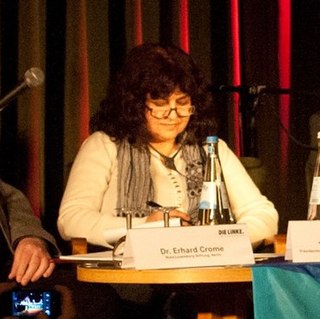Top 121 Sunni Quotes & Sayings - Page 2
Explore popular Sunni quotes.
Last updated on April 20, 2025.
Saudi Arabia isn't the enemy, but it is a problem. It could make so much positive difference in the Islamic world if it used its status to soothe Sunni-Shiite tensions and encourage tolerance. For a time, under King Abdullah, it seemed that the country was trying to reform, but now under King Salman, it has stalled.
And on this issue of the Shia in Iraq, I think there's been a certain amount of, frankly, Terry, a kind of pop sociology in America that, you know, somehow the Shia can't get along with the Sunni and the Shia in Iraq just want to establish some kind of Islamic fundamentalist regime. There's almost no evidence of that at all. Iraq's always been very secular.
Many of the fights that are going on are not ones that the United States has either started or have a role in. The Shia-- Sunni split, the dictatorships that have suppressed people's aspirations, the increasing globalization without any real safety valve for people to have a better life. We saw that in Egypt. We saw a dictator overthrown, we saw Muslim Brotherhood president installed and then we saw him ousted and the army back.
It is not coincidental that for so-called religious fundamentalists - whether they are Western or Eastern, Muslim or Christian - rigid male dominance and "holy wars" are priorities. Or that competing sects of the same religion, such as Sunni and Shia, are at each other's throats. In these cultures, women are rigidly controlled by men.
In the exodus out of Iraq, we're seeing the effects of just leaving. We left before there was control of chemical weapons stockpiles, without a status-of-forces agreement. We left before the Sunni and Kurds we fought with and fought alongside with were stable, or without empowering them. We left on a political rhetoric.
You [can] become part of someone else's narrative. Every once in a while I would get people asking me questions like, "If your husband is a Muslim, then why haven't you converted to Islam?" Interestingly enough, almost every person who asked me that was a Sunni, and it was their not-so-subtle way of implying that my Shiite husband was a bad Muslim for letting his infidel wife run around unconverted.
It wasn't just Shia that would go to Tehran and see the commander of the Quds Force and others and the legitimate government leaders. It was also Kurdish leaders and Sunni Arabs who would even link up with Qassim Suleimani, the commander of the Quds Force - maybe not in Tehran but in Turkey or somewhere else.
When Saddam Hussein was eliminated, the Iraqi statehood and thousands of people from the former Baath party were also eliminated. Thousands of Iraqi servicemen, who were part of the state's Sunni elite, found themselves thrown out into the street. No one gave a thought about them, and today they end up in the ISIS army.
I think that, given the threat that ISIS poses to the region and beyond, as we have sadly seen in our own country, it is important to keep the Iraqi army on a path where they can actually take back territory, to work with the Sunni tribes in Anbar province and elsewhere so that their fighters can be also deployed, to work with the Kurds to provide them the support, but they're doing the fighting. We're doing the support and enabling.
The first rules about Islamic law weren't even written down for a century and a half after the Prophet's death, and it was another five centuries, half a millennium, before they assumed anything like a definitive form. So there have always been huge arguments over what Islamic law actually requires. There are four main schools of law in Sunni thought and there's a separate school of law in Shia thought, so these arguments do take place.
The Iranian people were converted to Islam not very much longer after the conquest of the Arab world by Islam, but they refused to adopt the Arabic language, and it's a great point of pride to them that Persian culture and the Persian language and Persian literature survived the conversion to Islam. And the conversion to Islam also was for most of them not the Sunni majority form, but the Shia one. So there's a great discrepancy between Iranian society and many other of what we think of as Arab Muslim States and systems.
At the end of the day...if your army won't fight, it's because they don't trust their incompetent, corrupt generals, they don't trust each other. This is an enduring civil war between the Shia, the Sunni, and the Kurds. So I don't think we've got any options and we'd be ill-advised to start bombing where we really can't sort out the combatants or understand where the civilian population is.
Fourth, we will continue providing humanitarian assistance to innocent civilians who have been displaced by this terrorist organization. This includes Sunni and Shia Muslims who are at grave risk, as well as tens of thousands of Christians and other religious minorities. We cannot allow these communities to be driven from their ancient homelands.
Shari'a is not just the Qur'an, you see Shari'a is comprised according to all the doctrines. There's consensus and analogy - argument by analogy. These are the four components in the Shari'a. An orthodox Sunni would not accept that the Shari'a was simply comprised of the Qur'an itself and actually there are people who say that it's heretical to believe that. They have to say that because if they don't say that then they would have to accept that, for example, stoning is not a punishment which appears in the Qur'an - it doesn't.
I started out as a writer with an hour removed from Kingdom of Heaven. You have to make one print for the entire world, and that's something that influences the theatrical cuts of pictures to an enormous degree. It's a reality. You can't have one cut for the Sunni, and one for the Shia, and one each for Tories, Whigs, vegetarians, one cut for the Cineplex, and one for literary intellectuals.
The Sunnis no longer recognize the centralized government as a legitimate power. The Shia militia that is moving around is calling out war crimes that are anti-Sunni. So, the Sunnis are in a tough spot. Do they move to an ISIS, which is a radical Islamic terrorist organization? Or do they defend themselves? Or do they give up?
The Saudis are so happy. People don't understand, the Saudi Arabian government - kingdom - hates Iran. They're scared to death of Iran. That's Shi'a versus Sunni Muslim, and the Iranians are Persians. They're not Arabs. So it's a double whammy. There is no love lost, and the Saudis have been petrified over Barack Obama's peace dance and nuclear dealings with the nation of Iran. They are ecstatic to have Donald Trump.
There has always been a confusion in the West about -Islam and about the Middle East and the assumption that the countries are Arab. Iranians very much object to that. They are very proud of their own history, but they have this real inferiority-superiority complex thing about the Arabs and the position of Islam in Iran. One of the reasons why Shi'a Islam is so entrenched in Iran is because it has allowed the Iranians to distinguish themselves from the Arabs, who are mostly Sunni.
I mean, all of these things that [Bashar Assad] has done, there's no way even if President Obama wanted to just play along that you could actually achieve peace, because there are 65 million Sunni in between Baghdad and the border of Turkey, Syria, and Iraq, who will never, ever again accept Assad as a member - as a legitimate leader.
The Western alliance should have supported the Sunni opposition against the Assad regime from the beginning. As far as Iraq is concerned, if it had stayed stable the way it was in 2008, IS would not have been able to expand in Iraq the way they did. The mistake was that Barack Obama withdrew the armed forces from Iraq too fast.
Most people who read the autobiography perceive the narrative as a story that now millions of people know, and it was - it's a story of human transformation, the powerful epiphany, Malcolm's X journey to Mecca, his renunciation of the Nation of Islam's racial separatism, his embrace of universal humanity, of humanism that was articulated through Sunni Islam. Well, that's the story everybody knows.
What we would be committed to would be a representative government where all the Iraqi people decide who should lead their nation, and lead it in a way that keeps it together as a single nation and where all parts of the nation - Shia, Sunni and Kurds - are able to live free and in peace and believe that their interests are represented by the government.
Never mind that to me, the face of Afghanistan is that of a boy with a thin-boned frame, a shaved head, and low-set ears, a boy with a Chinese doll face perpetually lit by a harelipped smile. Never mind any of those things. Because history isn't easy to overcome. Neither is religion. In the end, I was a Pashtun and he was a Hazara, I was Sunni and he was Shi'a, and nothing was ever going to change that. Nothing.
There is no military solution to the war in Iraq. Our troops can help suppress the violence, but they cannot solve its root causes. And all the troops in the world won't be able to force Shia, Sunni, and Kurd to sit down at a table, resolve their differences, and forge a lasting peace. In fact, adding more troops will only push this political settlement further and further into the future, as it tells the Iraqis that no matter how much of a mess they make, the American military will always be there to clean it up.
As commander in chief, I will not speak to Vladimir Putin until we've set up that no-fly zone; until we've gathered our Sunni-Arab allies and begun to deny ISIS territory; until I've called the supreme leader of Iran and told him new deal - new deal. We the United States of America are going to cut off the money flow, which we can do; which we don't need anyone's permission or collaboration to do.
We as outsiders can't differentiate between Sunni and Shi'ah, but leave it to them and they'll get over the difficulty by some kind of hanky panky, just as the Turks did, and for the present it's the only way of getting over it. I don't for a moment doubt that the final authority must be in the hands of the Sunnis, in spite of their numerical inferiority; otherwise you will have a mujtahid-run, theocratic state, which is the very devil.
If you look in the Muslim World right now, the Shia, the Sunni Muslims are standing at the brink of a pit of fire started by Western intervention and influence in pitting them against each other by exploiting their divisions. So the stage is set for war in that area of the world that would destroy that area as completely as what they are calling the failed state Libya making Syria, Afghanistan and Iraq failed states.
Hillary Clinton, herself, in a leaked State Department email identified the Saudis as still the major funder of Sunni jihad around the world. And we would basically say to our allies that we will no longer support such policies which we, ourselves, have been a party to and that we would put a freeze on the bank accounts of countries that continue to fund jihadi terrorism.
By the end of 2008, clearly, the al Qaeda and Sunni insurgency had been relatively stabilized. And in the al Qaeda's mind, they were defeated. They actually said that in many of their transmissions that we were able to pick up. And the Shia militia, largely those trained by the Iranians in Basra and also in Sadr City, had been defeated.
The Sunni Arabs began to realize that they had made a huge mistake by not voting in the election of 2005 and by not being part of the new Iraq. They had reasons for this: They were effected by the disestablishment of the military and by de-Baathification (the dismantling of Saddam Hussein's party) in winter 2007-2007. They increasingly recognized that their future lay in being part of the solution rather than a continuing part of the problem.
For three years now, probably more, there is a clear common interest developed between Israel and the leading Sunni moderate entities. The Emirates, Saudi Arabia, Egypt, Jordan. And the common interest is to block radical Muslim terror, to counter the Iranian hegemonic and nuclear intentions, and to join hands in a huge infrastructure project from water, energy, transportation, whatever, in the whole Middle East.













































